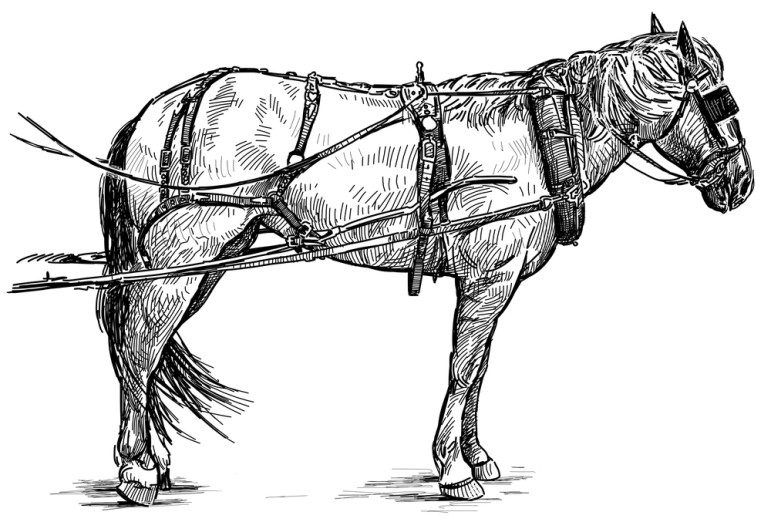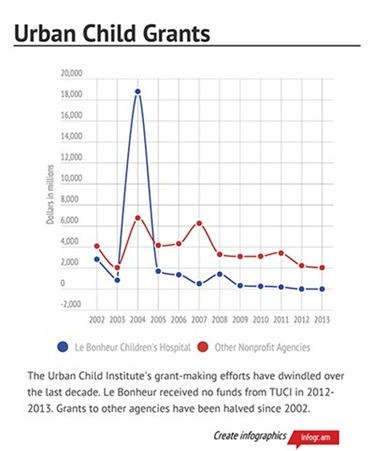
August 27, 2015; Memphis Flyer
Toby Sells, writing for the Memphis Flyer, published an article yesterday about The Urban Child Institute (TUCI), a 20-year-old health conversion foundation that was established to improve the lives of children through researching and funding interventions to be implemented before they reach the age of four.
With a staff of eleven and $148 million in the bank, and in a city where such interventions are desperately needed, TUCI has created a quiet buzz around itself about why more of that money is not being spent on grants and why so much is spent on the executive’s salary—that executive being the founder, Gene Cashman.
It probably would not be fruitful to ask such questions of TUCI board chairman Dr. Hershel “Pat” Wall, a physician and former chancellor of the University of Tennessee Health Science Center (UTHSC) and now a special assistant to the president of the entire UT system. UTHSC has been supported by TUCI grants at least as far back as 2002. UTHSC was TUCI’s largest grantee in 2013, receiving half of all the money given out that year, or $1 million. But how would he know what the money is spent on? He says he doesn’t see the books and is only “vaguely aware of how much money they’ve got and how much they give out.” He leaves it to overseer Cashman’s “very open and transparent management of the money.”
Wall does have a history with Cashman, however, in that he was the pediatrician to Cashman’s children back in the ’70s. He insists that Cashman is a “highly ethical, committed individual.”
“I can imagine what folks might be thinking about, that Gene is making a lot of money and he’s not spending as much as he ought to be in the community,” Wall says. “But I don’t think that’s the case.”
In 2011, Cashman’s compensation package was worth $444,342 and was 6.4 percent of TUCI’s total expenses. It spiked to $778,519, or 12.5 percent of TUCI’s total expenses, in 2012 and then inched down mildly in 2013 to $633,529—nearly 10 percent of TUCI’s total expenses.
We wish we could provide a little hope that Wall is an outlier on the board, but this article also quotes longtime board member Cyril Chang, an economics professor at the University of Memphis and director of Methodist Le Bonheur Center for Healthcare Economics at the U of M. When asked what he thought about the ways TUCI spends its money, Chang demurred, saying that he serves on the investment committee of the board, which does not direct spending.
“We spend our money on very meaningful projects,” Chang says. “We support the mission of getting the community to pay attention to—and become more aware—about brain development in the first three years. That’s our mission that we have been pursuing, so I’m very comfortable with pursuing that mission.”
Chang does say he understands why there might be criticism on how TUCI spends or does not spend its money. “Different organizations contribute to the welfare of children in different ways,” Chang observed, reflecting the same vague governance culture that Wall exhibited. “We have a lot of respect for how other institutions accomplish their missions and their ways, and we are comfortable with our way. We’re not saying our way is the best way, but we have our way of accomplishing our mission.”
Much of the criticism leveled at TUCI comes from the CEO’s outsized salary for managing an organization with just 11 employees, Cashman included. Meanwhile, even as assets and CEO salaries have grown, the grants have crept down fairly consistently:
Sign up for our free newsletters
Subscribe to NPQ's newsletters to have our top stories delivered directly to your inbox.
By signing up, you agree to our privacy policy and terms of use, and to receive messages from NPQ and our partners.

Sells does a quick comparison of Cashman’s salary to others in the vicinity, looking at the scale of operations.
In 2012, Baptist [Memorial Health Care Corporation] paid its former CEO, Stephen Reynolds, over $3 million for overseeing a system that employed more than 8,500. In 2012, Methodist [Le Bonheur] paid its CEO, Gary Shorb, more than $2 million to manage a system that employed more than 10,500. In 2013, Christ Community [Health Service] paid its then-CEO Richard Donlon $189,477 to direct more than 400 employees.
In 2013, TUCI paid Cashman more than $630,000 to oversee 11 employees.
Using this comparison, Reynolds got $353 per employee, Shorb got $190, and Donlon got $473. In one year, Cashman got $57,545 per employee at TUCI, including himself.
Asked about Cashman’s salary, Chang again demurred, saying he wasn’t the chairman of the compensation committee either, but when pushed, he stated, “He’s a very, very experienced business executive with many, many years of experience. He knows the health-care industry and also community services.”
But what’s to worry? Why sweat oversight? Maybe this setup is why there does not seem to be much internal angst about the fact that TUCI’s board is, in the reporter’s words, “laden with people from the institutions they fund.” As is stated in the article:
In 2013, the list included Wall, TUCI’s chairman, who also works at UTHSC, which gets money from TUCI, Chang, and Armour. The list also included Stanley Hyland, a researcher at U of M, which receives funds from TUCI. James Witherington, of the Neighborhood Christian Center, is on the TUCI board, and TUCI gave his group more than $630,000 in 2013. Frederick Palmer, a UTHSC doctor, served on the TUCI board in 2013.
Chang says the board is a mixture of “community folks and so forth,” and defends the role of U of M and UTHSC—two of the biggest organizations that TUCI funds—noting that their members are present but that they don’t dominate the TUCI board.
But all good things must come to an end. Sells writes that “the huge and growing investment fund, the dwindling grant funds allocated, and Cashman’s big payout” have been under getting under local people’s skins and that may mean the pitchforks are being dusted off in frustration. But where is the initiative for such a challenge to come from?
Sells’ article has done a major service for the Memphis community in naming the problem through good strong journalism, but is there anyone there to pick up the mantle on behalf of the children who might possibly need something real?—Ruth McCambridge










